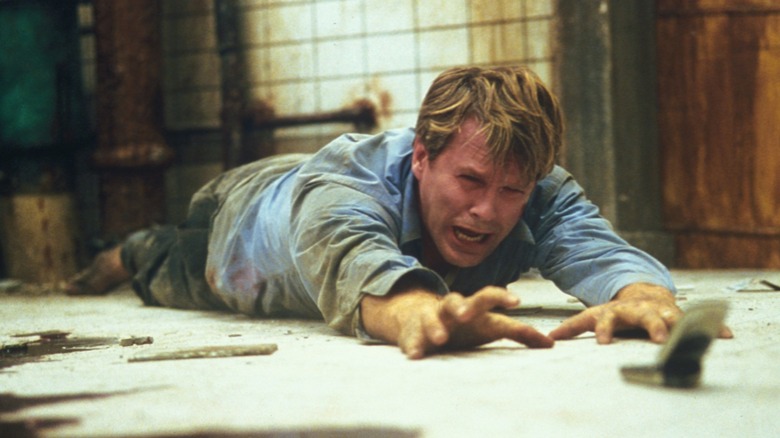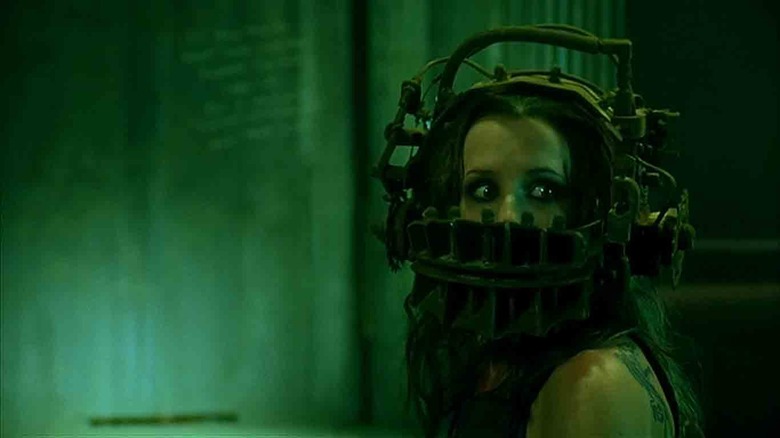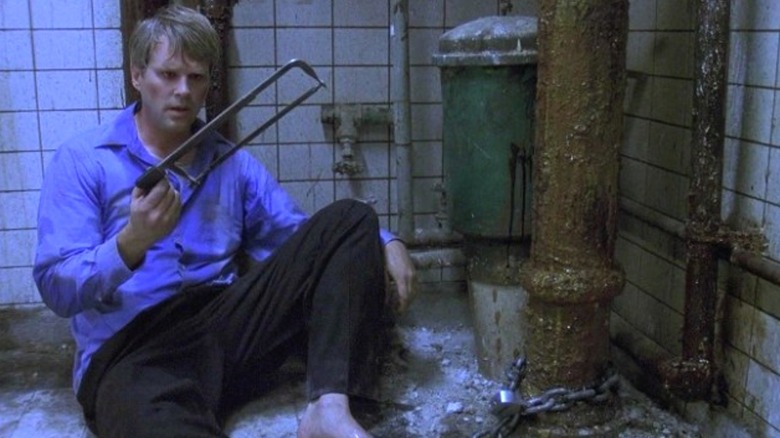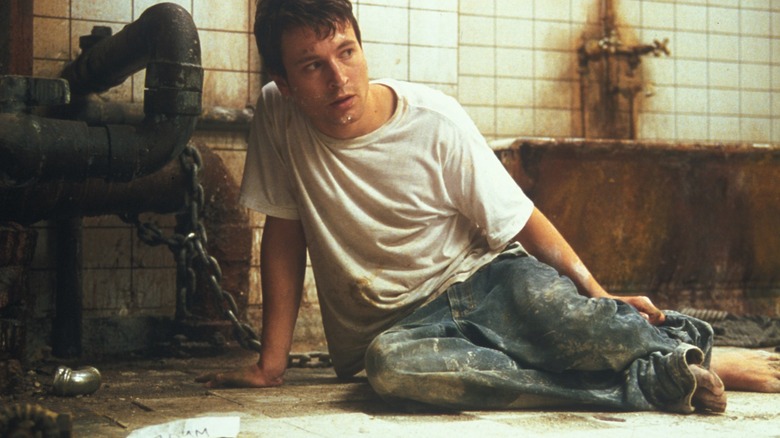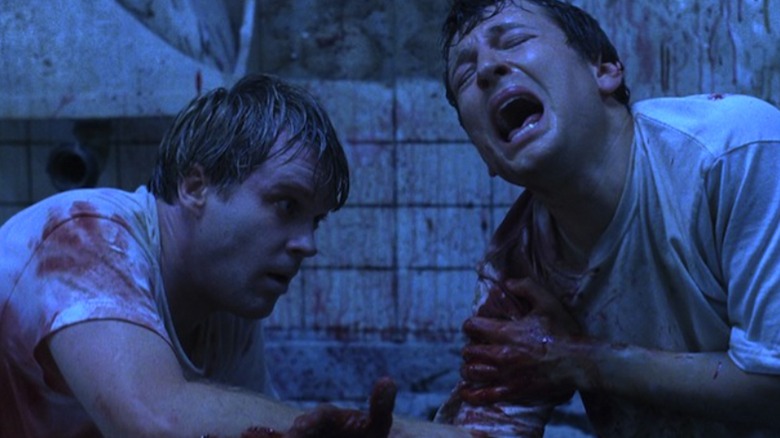Saw Ending Explained: Game Over
"I want to play a game." These words carry spine-chilling weight in the "Saw" franchise, always succeeded by a set of rules for an impossible death trap that needs to be evaded within a time limit. Over the course of 10 movies, and the 7-minute short that started it all, the "Saw" franchise has ballooned into an unforgettable phenomenon that consistently deepens the mythos surrounding John Kramer/Jigsaw (Tobin Bell), while the traps become more hellish and elaborate.
Call them splatter films, or twisted psychological horror with ample gore, the entries within the "Saw" franchise have always prided themselves on their twist endings, which often re-contextualize how their stories are perceived in the first place. James Wan's directorial feature debut, "Saw," kickstarted this convention without foreknowledge of its legacy by ending on a horrifyingly memorable beat that is still widely discussed and debated.
When "Saw" was originally released in 2004, it induced a sense of collective unease due to its "extreme" nature — thanks to hyperbolic sensationalization and the retroactive (and frankly, reductive) use of the term "torture porn." Yes, "Saw" cemented a foundation for gruesome traps and intricately gory shenanigans within the context of arbitrary, whimsical "games," but it also explored the vistas of human misery in excruciating detail, be it an apathetic outlook towards life or glib carelessness that comes with a dear cost. At its center is the dangerous, unpredictable Jigsaw, whose very existence is an enigma throughout "Saw" until the very end, where the mechanics of his twisted mind become crystal clear within seconds. There is no notion of fairness in Jigsaw's world, where survival demands excruciating pain that is physical and immediate, and even the strength to endure such extremes does not guarantee a way out.
What you need to remember about the plot of Saw
"Saw" opens with a close-up of the interior of a bathtub, which flushes as a man awakens suddenly, causing something to flush down the drain. Before we can process what that means, we are greeted with a morbid situation: two men, freelance photographer Adam (Leigh Whannell, who penned the story alongside Wan) and oncologist Lawrence Gordon (Cary Elwes) find themselves trapped in a disgustingly filthy bathroom. Chained to respective pipes, both men set their gaze upon a dead body between them, which has a revolver and cassette recorder on their person. The reason behind their shared predicament is unclear, adding to the absurdity of the horrifying situation — the only guide are instructions on tapes that demand that Gordon must kill Adam by 6 PM, while Adam needs to survive at all costs.
Gordon's foreknowledge of The Jigsaw Killer provides some clarity to the situation, as the killer is known to design brutal traps for testing his victims' will for survival. Both men find hacksaws that they try and use to cut off their chains, but after Adams' hacksaw breaks, Gordon realizes that they are meant to cut off their legs to escape. This, obviously, is an extreme survival scenario that demands extreme measures, pitting two strangers against one another in a game that is unspeakably cruel. Per Gordon, only one person is known to have escaped Jigsaw's trap so far, after being forced to fish out a key from inside a man's intestines upon killing him.
After Gordon fails to kill Adam, a hospital orderly named Zep (Michael Emerson) appears to be the culprit and bursts into the room to kill them, but Adam smashes a toilet lid over his head, killing him. Is this the end of the game?
What happened at the end of Saw?
"Saw" posits a scenario that is pretty straightforward, especially in comparison to the convoluted plots that occur down the line. Jigsaw appears to be consumed with the need to "remind" people that life is meaningful and hence, worth treasuring, and he drills this lesson home (often literally) by trapping them in situations that warrant hardened survival over traditional moral stances. Be it the willingness to mutilate oneself, or killing others to ensure one wins the game, the stakes are incredibly high, allowing no room for measured thinking. This is why the ending feels as brutal as it is: Jigsaw was in the room with them all along, playing dead right in front of them as the two men exposed their fatal flaws for everyone to see.
Gordon's willingness to chop off his leg earns him his survival, as he is able to escape, with the faint promise that he will come back for Adam. This is never allowed to materialize, as Adam's fate was sealed from the very beginning, right when he woke up and flushed the bathtub, letting the key to his chains drain down the pipe. Adam, of course, isn't the one to blame here, as he did not even get the chance to set his eyes upon his ticket to freedom, which poses pertinent questions about the fairness of his game. Surely, Jigsaw was aware of the key's loss, so why did he let him live so for long? The answer lies in a twisted, prolonged game of anticipation, where Jigsaw wants Adam to fight for survival, either by killing Gordon or doing something drastic to win.
Let us try and understand why Gordon and Adam were targeted in the first place, at least from Jigsaw's perception as the "gamemaster."
Hidden agendas
The reason Gordon is aware of Jigsaw is that he was the prime suspect in one of the cases investigated by Detective Tapp (Danny Glover), and his partner, who is now dead. Consumed by the need to find Jigsaw, Tapp hired Adam to tail Gordon as he found the man to be suspicious, and this revealed that the good doctor was having affairs with women for quite some time.
While never clearly stated, it is likely that Jigsaw trapped Gordon for his infidelity, as his actions directly disregard the sanctity of marriage and the bonds of family. When Gordon learns that Adam was the one who tailed him, distrust brews between them, adding more weight to the anticipation that he might pull the trigger. Gordon, however, rationalizes that the only way out is to use the hacksaw as it was meant to — proof that Gordon is taking life seriously and is dedicated to doing better.
This leaves us with Adam, whose vices do not extend beyond tailing a man he was paid to take pictures of as a freelancer, although this does not seem like a valid enough reason for such a brutal end. Adam's vice, at least in Jigsaw's eyes, is apathy, which he mentions in the tape he leaves, where he questions Adam's habit of watching others voyeuristically without any real involvement or emotion. "So are you going to watch yourself die here today, Adam, or do something about it?" Jigsaw taunts in the tape, urging Adam to take agency over his own survival by discarding the role of a passive voyeur. Adam fails, first with the accidental flushing of the key, and yet another mishap with a broken hacksaw, which seals his fate in a dark, filthy bathroom where he is doomed to die alone.
What the ending of Saw really means
Adam's fate has been the focus of much debate since the film was released 20 years ago, as it feels disproportionate to his vices, especially within the context of the recons in "Saw III." As Amanda (Shawnee Smith), the sole Jigsaw survivor before Gordon, is revealed to be the one to have placed the key without securing it, which further shifts the onus on her, instead of Adam, who had woken up in the bathtub, cold and disoriented. Moreover, Adam also displays the willingness to go to extremes to survive: he bludgeons Zep to death, actively tries to figure out ways to escape, and even shoots Gordon in the shoulder out of desperation. He also tries to kill Jigsaw, only to be electrocuted and left to rot to death.
The answer lies in Jigsaw's arbitrary rules, which become increasingly erratic as the franchise balloons. Take, for example, his game designated to Zep, an orderly who merely coveted the dreams of others instead of appreciating his own, where Jigsaw injects him with slow poison to simply test his willingness to survive. Zep does everything he is asked to but fails due to factors beyond his control, meeting a bloody death that isn't referenced ever again. In Jigsaw's eyes, Adam's ill luck lies in his inability to be more proactive about survival, despite being gifted the tools required to escape from the very beginning. It is a sadistic outlook that informs his psyche as a gamemaster, wherein he positions himself as judge, jury, and executioner.
This brutal unfairness is what makes the ending so unforgettable, as the tragedy of Adam's fate looms over the events in the future. He's not the first to lose a rigged game of survival, nor will he be the last.
